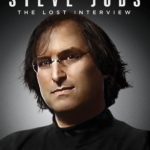 This is one of my favourite documentaries on Steve Jobs, an interview with the legend who’s at his best reliving his time at Apple, NeXT, and beyond. It’s full of anecdotes from his thought process on product design, and why Microsoft is after all…Microsoft and I thought to reproduce some of his insightful quotes. This interview was conducted by Bob Cringely in 1995, it was lost until the director of the series found a VHS copy in his garage, and released to theatres in 2012.
This is one of my favourite documentaries on Steve Jobs, an interview with the legend who’s at his best reliving his time at Apple, NeXT, and beyond. It’s full of anecdotes from his thought process on product design, and why Microsoft is after all…Microsoft and I thought to reproduce some of his insightful quotes. This interview was conducted by Bob Cringely in 1995, it was lost until the director of the series found a VHS copy in his garage, and released to theatres in 2012.
At a time when technology has virtually seeped into our psyche, this interview brings a tremendous insight as to how far we have come, and especially for Apple as a company as it continues to innovate.
On Becoming a Millionaire at a Young Age
“I was worth about over a million dollars when I was 23 and over $10 million when I was 24 and over $100 million when I was 25. And it wasn’t that important because I never did it for the money. I think money is a wonderful thing ’cause it enables you to do things. It enables you to invest in ideas that don’t have a short-term payback and things like that. But especially at that point in my life, it was not the most important thing. The most important thing was the company, the people, the products we were making, what we were gonna enable people to do with these products.”
On Discovering The GUI Experience at Xerox PARC
“I had three or four people who kept bugging me that I ought to get my rear over to Xerox PARC and see what they were doing. And so I finally did. I went over there. And they were very kind. And they showed me what they were working on. And they showed me really three things, but I was so blinded by the first one that I didn’t even really see the other two. One of the things they showed me was object-oriented programming. They showed me that, but I didn’t even see that. The other one they showed me was really a networked computer system. They had over a hundred Alto computers all networked, using e-mail, etcetera, etcetera. I didn’t even see that. I was so blinded by the first thing they showed me, which was the graphical user interface. I thought it was the best thing I’d ever seen in my life. Now, remember, it was very flawed — what we saw was incomplete, they’d done a bunch of things wrong, but we didn’t know that at the time. It still, though they had — the germ of the idea was there and they’d done it very well. And within, you know, 10 minutes, it was obvious to me that all computers would work like this someday.”
On Product Design Initiatives
“I remember having dramatic arguments with some of these people who thought the coolest thing in user interface was soft keys at the bottom of a screen, you know. They had no concept of proportionally spaced fonts, no concept of a mouse — as a matter of fact, I remember arguing with these folks — people screaming at me that it would take us five years to engineer a mouse and it would cost $300 to build. And I finally got fed up. I just went outside and found David Kelley Design and asked him to design me a mouse. And in 90 days, we had a mouse we could build for 15 bucks that was phenomenally reliable.”
On Building a Talented Team
“Very few things in life are like this, but what I was lucky enough to spend my life in is like this. And so I’ve built a lot of my success off finding these truly gifted people and not settling for “B” and “C” players, but really going for the “A” players. And I found something. I found that when you get enough “A” players together when you go through the incredible work to find, you know, five of these “A” players, they really like working with each other because they’ve never had a chance to do that before.”
On Remaining Customer-Focused
“Companies get confused when they start getting bigger, they want to replicate their initial success. And a lot of them think, “well, somehow there is some magic in the process of how that success was created.” So they start to try to institutionalize process across the company. And before very long, people get very confused that the process is the content. And that’s ultimately the downfall of IBM. IBM has the best process people in the world. They just forgot about the content. And that’s what happened a little bit at Apple too. We had a lot of people who were great at management process. They just didn’t have a clue as to the content.”
On Companies Losing Their Product Sensibilities
“If you were a product person at IBM or Xerox, so you make a better copier or a better computer — so what? When you have a monopoly market share, the company is not any more successful. So the people that can make the company more successful are sales and marketing people. And they end up running the companies. And the product people get driven out of the decision-making forums. And the companies forget what it means to make great products. Sort of the product sensibility and the product genius that brought them to that monopolistic position gets rotted out by people running these companies who have no conception of a good product versus a bad product. They have no conception of the craftsmanship that’s required to take a good idea and turn it into a good product. And they really have no feeling in their hearts usually about wanting to really help the customers. So that’s what happened at Xerox. The people at Xerox PARC used to call the people that ran Xerox “toner heads.” And they just had — these toner heads would come out to Xerox PARC and they just had no clue about what they were seeing.”
On Designing Better Products (The Importance of Art in Design)
“The only problem with Microsoft is they just have no taste. They have absolutely no taste. And what that means is — I don’t mean that in a small way. I mean that in a big way, in the sense that…they don’t think of original ideas and they don’t bring much culture into their product. And you say, “Well, why is that important?” Well, you know, proportionally spaced fonts come from typesetting and beautiful books. That’s where one gets the idea. If it weren’t for the Mac, they would never have that in their products. And so I guess I am saddened — not by Microsoft’s success. I have no problem with their success. They’ve earned their success for the most part. I have a problem with the fact that they just make really third-rate products. Their products have no spirit to them. Their products have no sort of spirit of enlightenment about them. They are very pedestrian. And the sad part is that most customers don’t have a lot of that spirit either.”
On The Future of Computing
“You know, I think the Internet and the web — there are two exciting things happening in software and in computing today. I think one is objects, but the other one is the web. The web is incredibly exciting because it is the fulfilment of a lot of our dreams that the computer would ultimately not be primarily a device for computation but metamorphosize into a device for communication. And with the web, that’s finally happening. And secondly, it’s exciting because Microsoft doesn’t own it and therefore there’s a tremendous amount of innovation happening. So I think that the web is gonna be profound in what it does to our society.”
“As you know, about 15% of the goods and services in the US are sold via catalogues or over the television. All that’s gonna go on the web and more. Billions and billions, soon tens of billions of dollars’ worth of goods and services are gonna be sold on the web. If you could — a way to think about it is that it is the ultimate direct-to-customer distribution channel. Another way to think about it is the smallest company in the world can look as large as the largest company in the world on the web.”
“So I guess — I think the web — as we look back 10 years from now, the web is going to be the defining technology, the defining social — the defining social moment for computing. And I think it’s going to be huge. I think it’s breathed a whole new generation of life into personal computing.”
On “Are You a Hippie or a Nerd?” (What a Wonderful Response!)
Oh, if I had to pick one of those two, I’m clearly a hippie — (and) all the people I worked with were clearly in that category too. Well, ask yourself, what is a hippie? I mean, this is an old word. It has a lot of connotations. But to me, ’cause I grew up — I mean, remember that the ’60s happened in the early ’70s, right? So we have to remember that. And that’s sort of when I came of age, so I saw a lot of this. And a lot of it happened right in our backyard here. So to me, the spark of that was that there was something beyond sort of what you see every day. There’s something going on here in life beyond just a job and a family and two cars in the garage and a career. There’s something more going on. There’s another side of the coin that we don’t talk about much. And we experience it when there’s gaps, when we kind of just aren’t really — when everything’s not ordered and perfect, when there’s kind of a gap. You experience this in-rush of something. And a lot of people have set off throughout history to find out what that was, whether it’s Thoreau, or whether it’s some Indian mystics or whoever it might be. And the hippie movement got a little bit of that, they wanted to find out what that was about. And that life wasn’t about what they saw their parents doing. And of course, the pendulum swung too far the other way and it was crazy, but there was a germ of something there. And it’s the same thing that causes people to want to be poets instead of bankers, you know?
And — and I think that’s a wonderful thing. And I think that that same spirit can be put into products. And those products can be manufactured and given to people and they can sense that spirit. I mean, if you talk to people that use the Macintosh, they love it. I mean, you don’t hear people loving products very often — you know, really. But you could feel it in there. There was something really wonderful there. So I don’t think that most of the really best people that I’ve worked with have worked with computers for the sake of working with computers. They’ve worked with computers because they are the medium that is best capable of transmitting some feeling that you have that you want to share with other people. You know, before they invented these things, all these people would have done other things. But computers were invented, and they did come along. And all these people did get interested in school or before school and said, “hey, this is the medium that I think I can say something in.”
Concluding Thoughts
This was a landmark documentary in many ways. While watching the film I had to remind myself that it was the 90s when tech innovation was beginning to escalate. In that regards, a lot of what was predicted by Steve Jobs has come true today. For instance, Steve prophesized the rise of online retail websites through the web, which came true in the late-90s. Also, the computer has indeed “metamorphosized” into a communications device and “software” as we identified back then has almost become obsolete through cloud computing – so either we are using computers to reach out to other people using emails, or ‘communicating’ with servers to store or create files (SaaS/PaaS). Last but not the least, ‘personal computing’ has transformed into a personalized experience enabling a new set of generational attitudes through social networking sites such as LinkedIn, Facebook, and Twitter.


